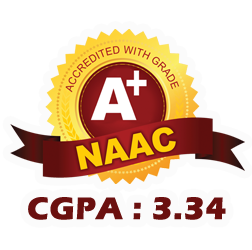NAAC
National Assessment and Accreditation Council (NAAC) was established by the UGC in September 1994 at Bangalore for evaluating the performance of the Universities and Colleges in the Country. NAAC's mandate includes the task of performance evaluation, assessment and accreditation of universities and colleges in the country. The philosophy of NAAC is based on objective and continuous improvement rather than being punitive or judgmental, so that all institutions of higher learning are empowered to maximize their resources, opportunities and capabilities. Assessment is a performance evaluation of an institution and /or its units and is accomplished through a process based on self-study and peer review using defined criteria. Accreditation refers to the certification given by NAAC which is valid for a period of five years. At present the Assessment and Accreditation by NAAC is done on a voluntary basis..
Criteria for Assessment:
- (1) Curricular Aspects
- (2) Teaching learning and Evaluation
- (3) Research consultancy and Extension.
- (4) Infrastructure and learning Resources.
- (5) Student support and progression.
- (6) Organisation and management.
- (7) Healthy Practices
Process for Assessment and Accreditation:
- Preparation of the self-study Report by the Institution/ department based the parameters defined by NAAC.
- Validation of self-study Report by a team of peers through an on-site visit, presentation of a detailed quality report to the institution.
- The final decision an assessment and accreditations by the Executive Committee of NAAC.
- Networking among accredited institutions in order to promote exchange of best practices.
- Formation of Quality circles for follow-up of a accreditation outcomes.
- State-wise analysis of accreditation results for policy initiatives.
- Promoting the concept of lead colleges and cluster of colleges for quality initiatives.
- Project grants for accredited institutions for quality innovations.
- Financial support to accredited institution for conducting seminars/conferences/workshops on quality issues in Higher Education.
- Developing international linkages for mutual recognitions.
- Collaborating with other national professional bodies for accreditation of specialized subjects.
- NAAK Distance Education Council joint venture for accreditation of open Universities and Correspondence courses.
- State-level coordination Committees for Accreditation.
- National Consultative Committees on Accreditation in different disciplines.
- Interaction with other agencies to develop a National Qualifications framework.
- Development of Date-base expertise and Infrastructure.
- Training programmes for quality promotion and excellence in Higher Education.
- NAAC-NCTE joint activity for self-appraisal and Accreditation of Teacher Education Institutions.
- Post-Accreditation Review and Quality Sustenance in Accredited Institutions.
- Accreditation and TQM in Collegiate Education: MOU with government of Karnataka.
- CII-NAAC Higher Education Summits.
Benefits:
- Helps the institutions to know strengths, weaknesses, opportunities through an informed review.
- Identifies internal areas of planning and resource allocations.
- Enhances Collegiality on the campus.
- The outcome of the process provides the funding agencies with objectives and systematic database for performance funding.
- Initiates institution into innovative and modem methods of pedagogy.
- Given the institution a new sense of direction and identity.
- Provides the society with reliable information on the quality of education offered by the institution.
- Employers have access to information on standards in recruitment.
- Promotes intra-institutional and inter-institutional interactions.
Coordinator
|
Dr.P. Sathiya Bama
Associate Professor & Head
Department of Zoology
E_mail : yaeshabna@rediffmail.co
Mobile : +91 90953 18690
|
 |

